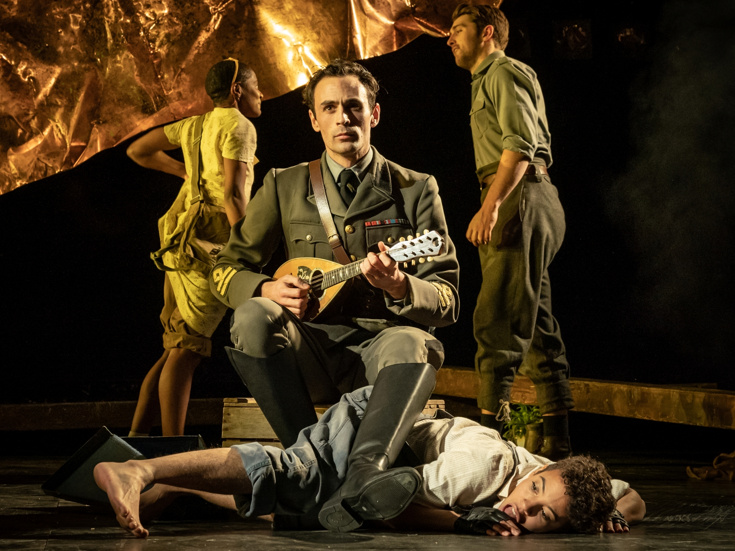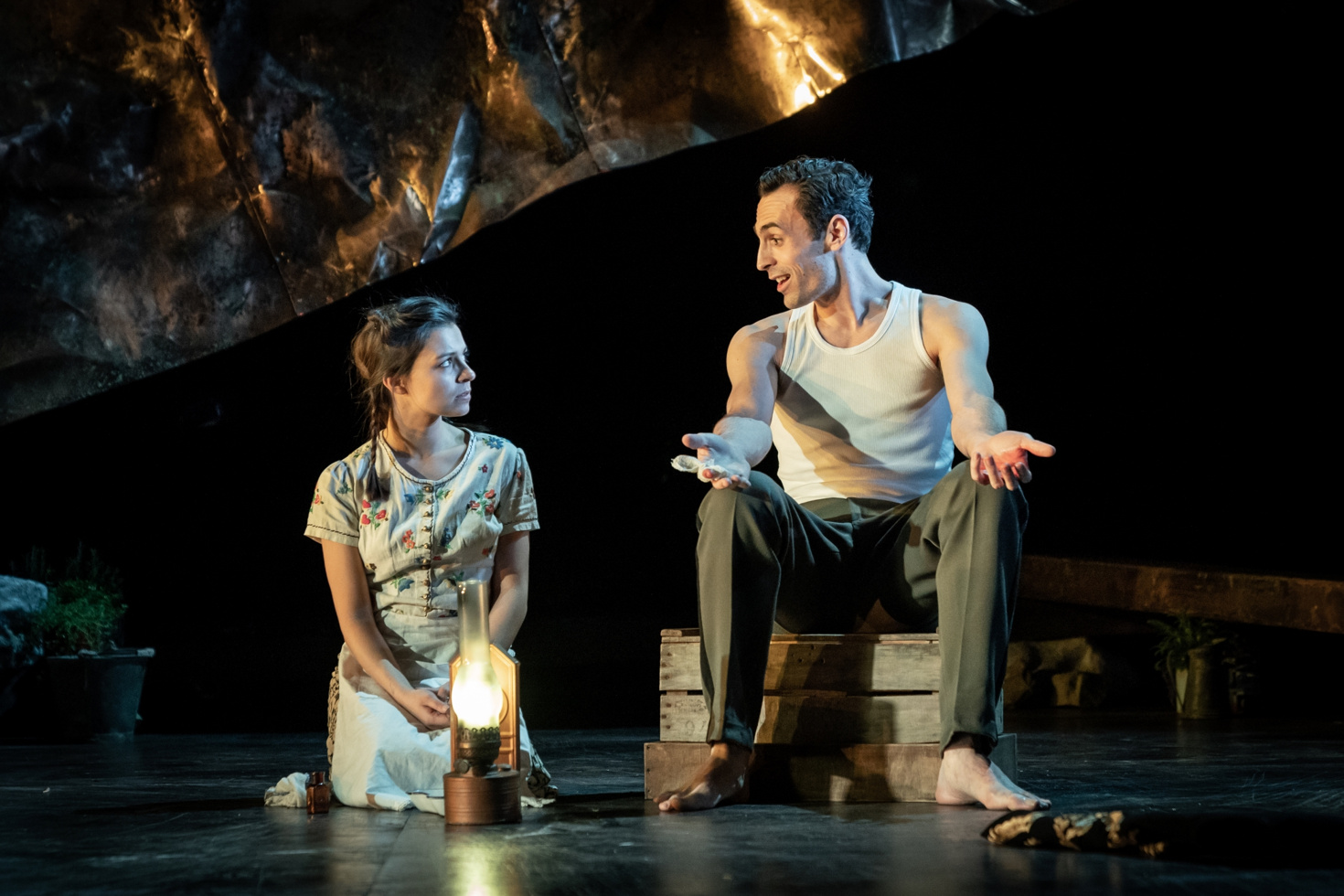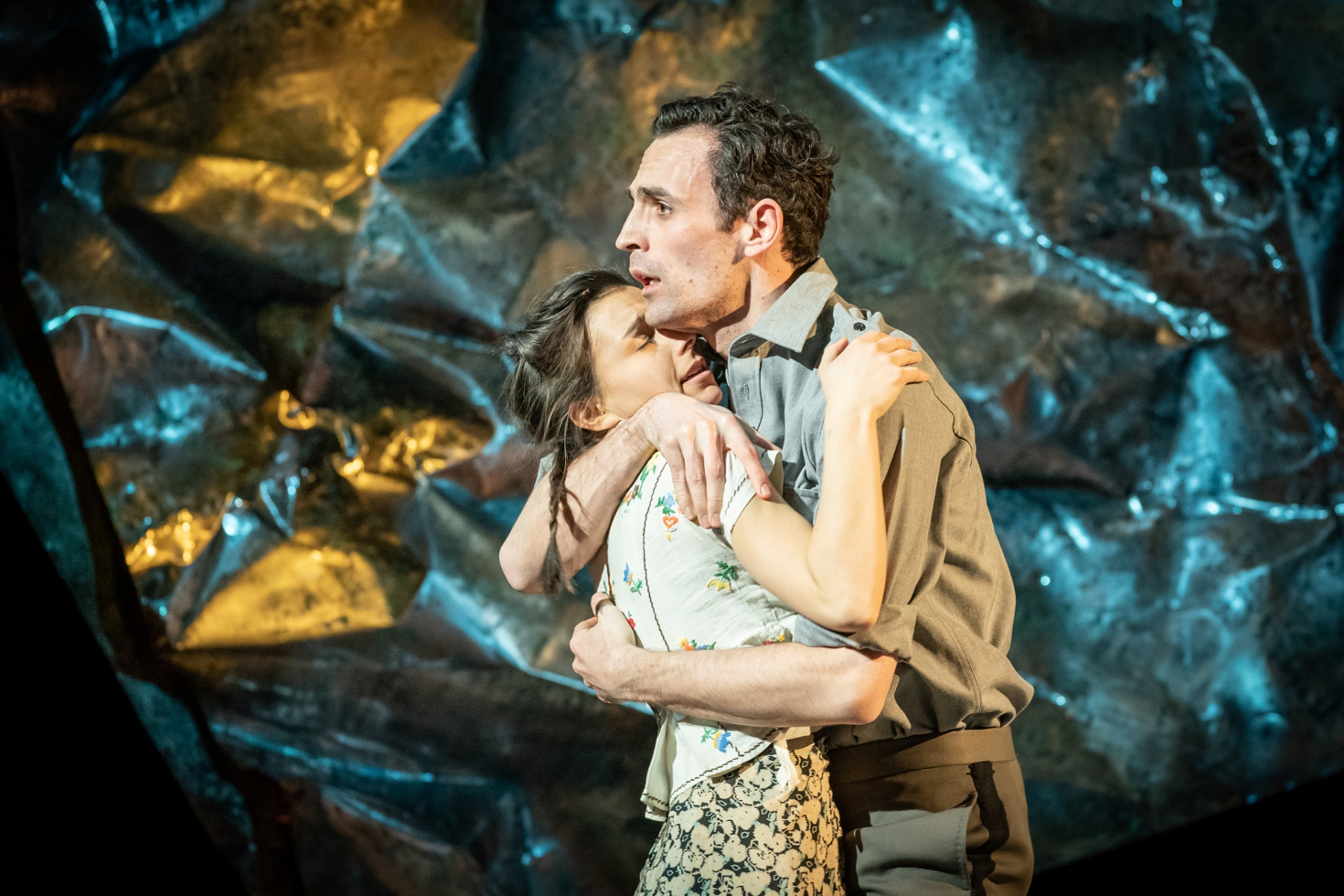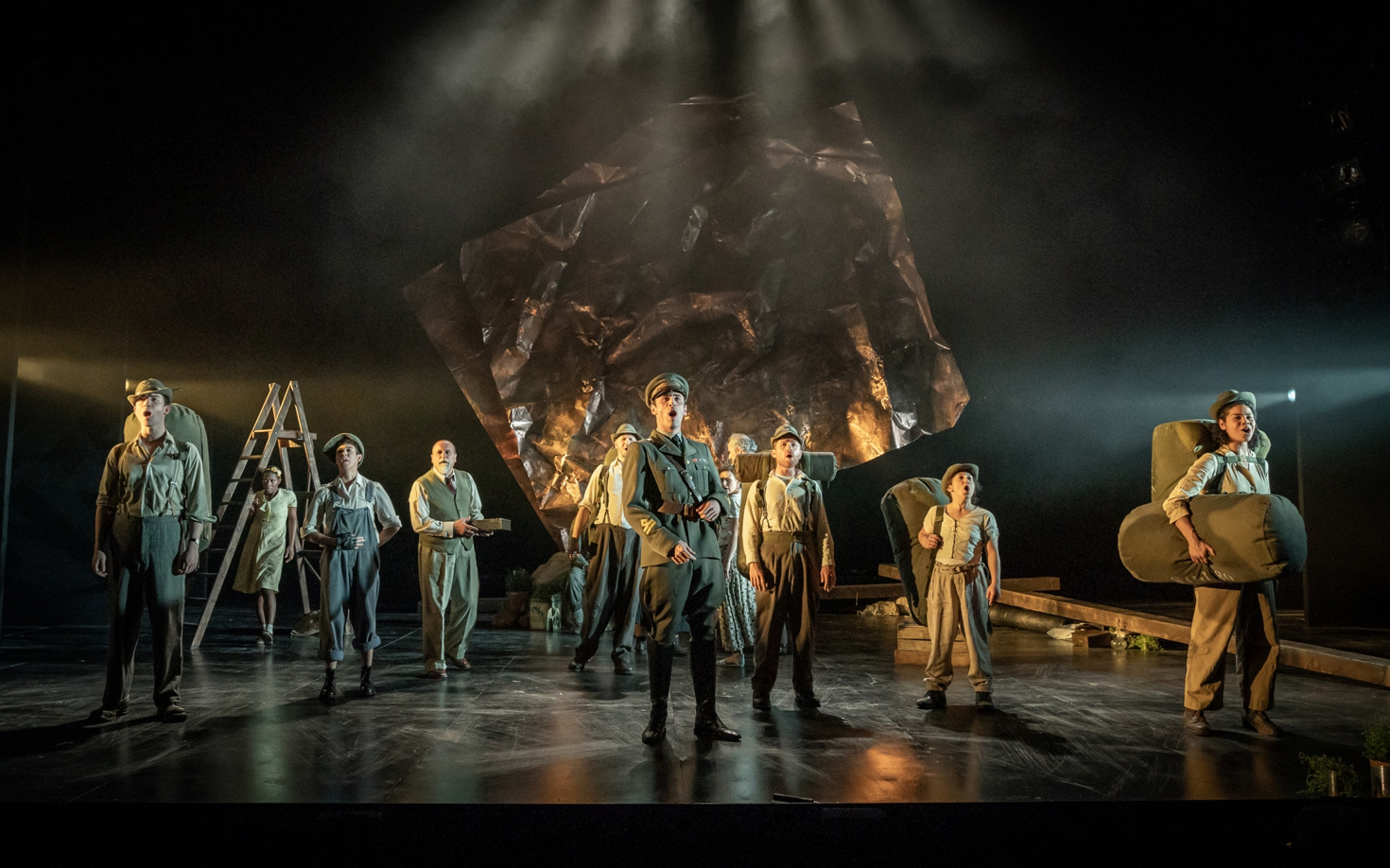Alex Mugnaioni on the Thrill of Making His West End Debut in Captain Corelli’s Mandolin

(Photo: Marc Brenner)
Alex Mugnaioni has worked at Shakespeare’s Globe, touring the Bard to North and South America, but only now is the actor making his West End debut, and in a work well away from the Bard. Beginning on July 4, he can be seen as the Corelli of the title in Captain Corelli’s Mandolin, adapted by Rona Munro from the beloved 1994 historical novel by Louis de Bernières and running for nine weeks at the Harold Pinter Theatre following a U.K. tour. Broadway.com caught up with the charming and versatile performer to discuss musicianship, fake tans and unleashing (or not) his inner Nicholas Cage.
How does it feel to be making your West End debut?
I’m very excited! There was a period during our tour when we thought we weren’t going to go into town and then the stars aligned and here we are performing at the Harold Pinter Theatre for nine weeks—and who knows, it might have a future after that.
Are you pleased for that to be happening with this particular play?
I’d never really thought about being on the West End and sort of knew that I wouldn’t be in The Woman in Black or The Mousetrap, so this is just a massive surprise. This is the kind of theater I always wanted to be involved in but I don’t think any of us ever imagined it would go into the West End. We owe a lot to Neil Laidlaw, our producer, who had faith in it and wanted to make it happen and is making it happen.
How do you see Corelli, at least as presented in this version by Rona Munro of the hugely successful novel?
He’s a captain in the Italian army of an artillery regiment stationed in Cephalonia in the middle of World War II at the time that Italy and Germany invaded Greece, and he is sort of a victim of circumstance.
In what way?
He doesn’t want to be at war and doesn’t want to be an occupying force: he just wants to play his mandolin and write music. It’s funny: speaking to you I feel as if I am talking about [Corelli] as if he were a real person. That’s the thing about the book: you feel as if they are all real historical people!
What role does the mandolin play in his life?
He’s named it Antonia, and Corelli’s first name is Antonio so he believes the mandolin to be the other half of himself. He has no parents and is a bit of a nomad so the instrument is something he feels he can be at one with.
Unlike Corelli, weren’t you early in this process rather dramatically separated from your mandolin?
You know, there should be a rule that you are warned when you get on a train never to put your items on a rack if you want to keep hold of them. I’d had the mandolin with me for four months and after a very long day of rehearsals, when we had finished around nine or ten p.m., I got off the train and got home and had dinner and realized I had left it on the train.

(Photo: Marc Brenner)
What happened then?
It was sort of amazing publicity: Captain Corelli loses his mandolin! We got some lovely offers from people on Twitter saying, “Use my mandolin,” but unfortunately they weren’t quite right. There’s a specific mandolin you have to have in the show, so we had to find the exact right one.
Had you had mandolin training before?
I started as a brass player on the cornet and my teacher was like, “You’re not very good at this,” so I moved on to the euphonium, which is sort of a small tuba. I then went on to the trombone and taught myself guitar and a bit of piano—unfortunately you can’t play them all at the same time! [Laughs]
In the spirit of authenticity, were you tempted to head to Cephalonia yourself for inspiration?
I think Melly [Still, the director] and Neil and a few of the others went on a sort of creative “jolly” before the cast was pulled together, but we weren’t funded to go there. I said I’d love to go and do some research, and the production team said that if I and the cast wanted to get a bus together and go, that would be good publicity and we could do a blog while we were there—but there wasn’t time.
Have you consulted the 2001 John Madden film of the same novel, with Nicholas Cage as Corelli?
No, I haven’t. Somebody got me the film last December for my birthday and it’s still in the plastic wrapping. I avoided it because I wanted to make up my own mind about who Corelli was, rather than be in any way infected by the performance in the film. That can happen once you get something in your head.
No chance, therefore, of unleashing your hidden Nicholas Cage?
[Laughs] Well, I don’t want to speak badly about other actors but [the film] wasn’t massively well-received at the time, unfortunately. One of the nicest things I’ve had said to me is that Louis [de Bernières, the novelist] told me I was what he had imagined Corelli to be—except that he had thought Corelli might be shorter! [Mugnaioni is 6'1"].

(Photo: Marc Brenner)
What about looking the role: have you gone for a Mamma Mia!-style perma-tan?
I had an idea that Corelli would have a tan and did one session on a sunbed and never went again! I think learning the mandolin was enough.
What do you think might happen if anyone comes along to this play expecting Harold Pinter, since not only is your West End theater named for the English Nobel laureate but it has been hosting revivals of his work for much of the last year?
It depends on how you do Pinter, I suppose! We’re having to condense a whole six-hundred-page novel into a two-and-a-half-hour play so you can’t do it all through dialogue: we use movement and music, as well. Also, we try not to pause: we’ve got to cover a lot of ground.
Will you be taking the dressing room recently vacated by Tom Hiddleston, who starred in a sellout production there of Pinter’s 1978 masterwork Betrayal?
[Laughs] Maybe, I’ll definitely be treading the same boards. And you know what? I get likened to [Hiddleston] a little bit; I think it’s just the accent, to be honest.
That’s cool: do you ever get mistaken for anyone else?
Someone thought I was James Franco once. I don’t look like him anymore but I probably did when I was younger. Someone came up to me thinking I was but I had to tell that person that unfortunately he had the wrong guy.
How does it feel to have your next job already set, following this one?
It’s pretty great, right? I’m going to be playing John Wilkes Booth in an actor-musician production [where performers play their own instruments] of Stephen Sondheim’s Assassins, at the Watermill [Theatre west of London] and then Nottingham Playhouse. I think musical theater is incredible and Sondheim has that extra quality that is thought-provoking and requires singing chops and also acting chops.
What instrument will you be playing?
I’m assuming the mandolin! It’s a skill I have so I would be surprised if they don’t use it.

(Photo: Marc Brenner)
Articles Trending Now
- Death Becomes Her, Maybe Happy Ending, Oh, Mary! and More Earn Nominations for the 2025 Broadway.com Audience Choice Awards
- Maybe Happy Ending Will Be Hitting the Road on a National Tour, Launching Fall 2026
- Ali Louis Bourzgui Reflects on Joining Hadestown, His Upcoming Album and Processing the Experience of Tommy